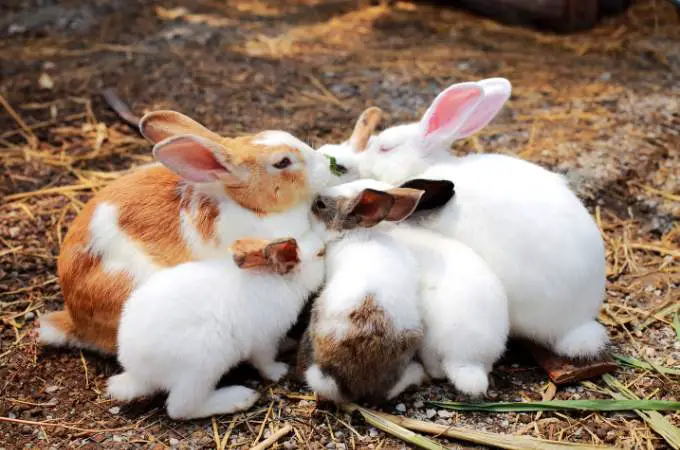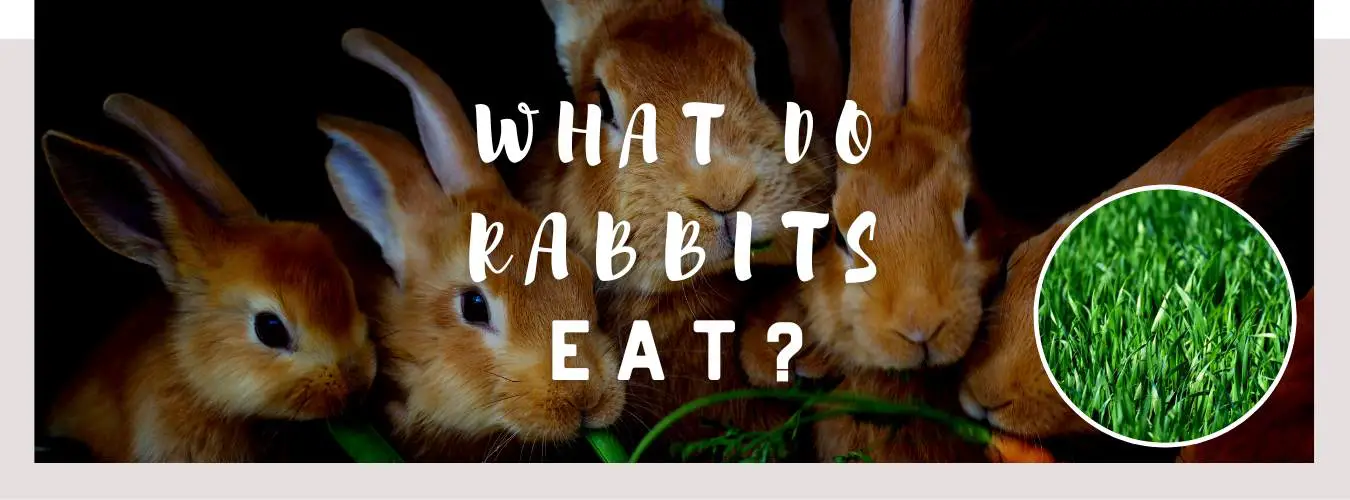
Rabbits are beloved pets to many, so it’s essential to understand their nutritional needs to keep them healthy and contented. In this article, we’ll cover everything you need to know about rabbits’ natural diet – what foods they should eat naturally, as well as which ones not to feed. Let’s get started!
You might also like: What Fruits Can Rabbits Eat?
Rabbit’s Natural Diet
Wild Rabbits
In the wild, rabbits typically feed on grasses, leaves, and other vegetation. Their diet consists mainly of high-fiber low-calorie foods to promote a healthy digestive system; they may also occasionally nibble on fruits, seeds, or bark.
Domestic Rabbits
Domestic rabbits share similar dietary needs as their wild counterparts, however, they rely on their caretakers for proper nutrition. Therefore, it’s essential to replicate their natural diet as closely as possible to guarantee they receive enough essential vitamins and minerals.
Rabbit Nutrition Needs
Fiber
Rabbits need a diet rich in fiber for optimal digestive health. A high-fiber diet promotes healthy gut bacteria, prevents obesity, and keeps teeth clean and pearly white.
Protein
Protein is essential for rabbits’ growth and repair of tissues. But too much protein can lead to health issues, so it’s essential that they maintain the appropriate balance.
Vitamins and Minerals
Rabbits require vitamins and minerals for good overall health, such as calcium and phosphorus for strong bones and teeth, plus vitamin A for correct vision.
Foods to Feed Your Rabbit
Hay is the cornerstone of a rabbit’s diet, providing essential fiber, vitamins, and minerals. Timothy orchard or meadow hay is ideal for adult rabbits, while alfalfa hay has higher protein and calcium content, making it suitable for young and pregnant rabbits.
Vegetables
Fresh, leafy greens should comprise a substantial part of your rabbit’s diet. Some great options include romaine lettuce, kale, spinach, and collard greens. Introduce new vegetables gradually so as not to shock their digestive system.
Fruits
Fruits should only be offered as an occasional treat due to their higher sugar content. Apples, bananas, and berries all make suitable treats; however, always remove seeds and pits before offering them to your rabbit. Limit fruit intake to no more than one tablespoon per two pounds of body weight daily.
Pellets
Pellets can provide your rabbit with additional nutrition, but should never replace hay and fresh vegetables. Look for high-quality pellets made of hay that have been fortified with essential vitamins and minerals. Be mindful when portioning out these treats in order to prevent overfeeding or potential health issues.
You might also like: What Vegetables Can Rabbits Eat?
Foods to Limit
Avoid high-sugar and high-fat foods.
Avoid feeding your rabbit foods that contain high levels of sugar or fat, such as chocolate, cookies, or candies. Doing so could lead to obesity, dental issues, and other health complications for your furry friend.
Processed Human Foods
Rabbits have delicate digestive systems and should not consume processed human foods like bread, pasta or cereal. Stick with their natural diet for optimal health benefits.
Certain Plants
Certain plants can be toxic or hazardous to rabbits, such as onion, garlic, avocado and rhubarb. Be cautious when introducing new foods into your pet’s diet and always research their safety before feeding it anything.
Portion Control and Frequency
Hay and Water
Rabbits should always have access to fresh hay and clean water, as these are essential for their wellbeing.
Vegetables
As a general guideline, aim for at least one cup of leafy greens per two pounds of body weight daily. Gradually introduce new veggies into your diet so as not to cause digestive upset.
Fruits
As previously stated, fruits should only be offered occasionally as an occasional treat and limited to one tablespoon per two pounds of body weight per day.
Pellets
Adult rabbits should receive approximately 1/8 to 1/4 cup of pellets per five pounds of body weight daily. Younger rabbits may require more food in order to support their growth and development; it’s essential to monitor their weight and adjust amounts appropriately.
Treats and Toys
Safe treats for rabbits include fruits, fresh herbs such as basil, mint or cilantro; however these should only be given sparingly and in moderation to avoid disrupting their diet.
Chew Toys
Chewing is an instinctive behavior for rabbits and helps keep their teeth healthy. Provide your rabbit with safe chew toys like untreated wood, cardboard or hay-based items to meet their chewing requirements.
Monitoring Your Rabbit’s Health
Monitoring your rabbit’s health is essential for any responsible pet parent.
Weight
Regularly monitoring your rabbit’s weight can help you detect any potential health issues early. Sudden changes in weight could indicate an issue and should be discussed with a veterinarian.
Dental Health
Rabbits’ teeth continue to develop, and a nutritious diet with plenty of hay and chew toys can help them wear down. Regularly check for signs of overgrowth in your rabbit’s teeth, and consult your vet if any issues arise.
Digestive Health
A rabbit in good health will produce small, round and firm droppings. If you observe any changes in their droppings – such as diarrhea or fewer droppings – consult with your veterinarian as these could indicate digestive issues.
Conclusion
Understanding what rabbits eat is critical for their health and happiness. By feeding your bunny a balanced diet that includes hay, fresh vegetables, occasional fruits, and limited pellets, you can guarantee they get all of the essential nutrients they need for an active and fulfilling life. Regularly monitor their weight, dental health, digestive health – and consult a veterinarian if any issues arise. Happy and healthy rabbits make wonderful companions!
You might also like:
- Can Rabbits Eat Grapes?
- Can Rabbits Eat Pineapple?
- Can Rabbits Eat Cantaloupe?
- Can Rabbits Eat Mango?
- Can Rabbits Eat Peaches?
- Bunnies Eating Raspberries
- Can Bunnies Eat Pears?
What Vegetables Can Rabbits Eat?
- Do Wild Rabbits Eat Celery?
- What Vegetables Can Rabbits Eat Daily?
- Can Rabbits Eat Lettuce?
- Do Wild Rabbits Eat Carrots?
- Do Rabbits Eat Cucumbers?
- Can Rabbits Eat Okra?
- Can Rabbits Eat Onions?
- Can Rabbits Eat Celery?
- Can Rabbits Eat Spinach?
- Do Rabbits Eat Asparagus?
- Can Rabbits Eat Radishes?
- Can Rabbits Eat Green Beans?
- Can Rabbits Eat Zucchini?
- Can Rabbits Eat Pumpkin?
- Can Bunnies Eat Brussel Sprouts?
- Can Rabbits Eat Spring Mix?
What Do Desert Rabbits Eat?
Do Rabbits Eat Lantana?
Do Rabbits Eat Vinca?
How to Tell if Mother Rabbit is Feeding Babies
What Do Cottontail Rabbits Eat?
Can Rabbits Eat Weeds?
Do Rabbits Eat Worms?
Can Rabbits Eat Eggs?
Rabbit Food
Can Bunnies Eat Parsley?
Can Rabbits Eat Cilantro?










